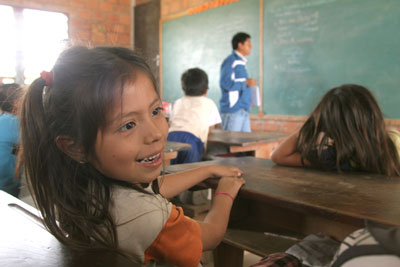A regional workshop in Lima establishes ten priorities for disaster risk reduction in the education sector

Foto: © UNICEF/Luis Vera
In the context of the world campaign titled “Prevention Starts at School,” and with the goal of establishing regional partnerships around joint efforts that strengthen the capacity of the education sector regarding disaster risk reduction and related crises, a regional workshop was held in Lima on September 9-11, 2008. The name of the regional gathering was “Building Alliances to Strengthen the Capacity of the Education Sector.”
The meeting gathered 41 representatives from 11 international cooperation agencies: Save the Children, UNICEF, International Rescue Committee (IRC), UNISDR, OFDA/USAID, PREDECAN/ CAN, OAS, IFRD, UNESCO, Plan International, Practical Solutions-ITDG, and the Andean Community. In addition to members of a number of national institutions, participants also included representatives of the Ministries of Education and national civil protection systems, such as CONRED Guatemala, the National Emergency Commission of Costa Rica, the National Civil Defense Institute of Peru (INDECI), the Ministries of Education of Ecuador, El Salvador, Honduras and Peru, and the Risk Management Secretariat of Ecuador.
The breadth and scope of experience these institutions were able to bring in their corresponding fields provided a unique opportunity to validate and coordinate efforts at the regional level on issues related to education and risk management.
The Lima workshop also aimed at fostering international cooperation by advancing the creation of a strategic alliance with agencies working in this field, DIPECHO partners and national authorities. The alliance had two main goals in mind: to guarantee the right to education in emergency situations, and to build a culture of prevention by implementing a number of concrete actions for disaster preparedness, reduction and response.
Participants worked on the development of four thematic issues: 1) challenges posed for institutionalizing risk management within the education sector; 2) school infrastructure; 3) contributions of the education sector to build a culture of prevention, and 4) preparedness and response for vulnerability reduction within this sector.
Drawing on these issues, and as the main outcome of the workshop, ten priority actions were established:
- Promote the development of indicators of regional minimum standards for temporary classrooms, psychosocial services and infrastructure.
- Promote that curricular proposals on disaster risk reduction from the Ministries of Educations are accompanied by training processes for higher education teaching staff.
- Assess the standards and regulations that include the role of the education sector and identify critical aspects that limit their implementation.
- Promote that schools be used as temporary shelter only as a last resort and, whenever this is inevitable, include this possibility in schools plans.
- Insist that continuous education programs implemented by the Ministries of Education include disaster risk reduction.
- Map institutions that train teachers, and incorporate disaster risk management as a cross-cutting or specific issue. Identify regulatory institutions and learn about what they are doing in this field.
- Foster the development and/or the strengthening of approaches and tools for the evaluation and inventories of schools based on the different hazards.
- Develop a proposal that includes the basic skills for disaster risk reduction that every teacher must acquire through regular training.
- Document national experiences of sectorial education boards in Latin America and the Caribbean. Promote and support the creation and/or the strengthening of sectorial education boards.
- Map national models of school plans that already exist in the region.
In line with the goals established at the Lima regional workshop, the actors involved in emergency education who had the opportunity to participate in the first session of the Regional Platform for Disaster Risk Reduction in the Americas —held on March 17- 19, 2009 in Panama City— were able to consolidate strategic ties based on the work done by the DIPECHO project, whose efforts were made under the guidelines of ECHO and the coordination of UNICEF-TACRO.
In the context of the Regional Platform for Disaster Risk Reduction, a thematic session on education was held. During the session, the members of the Alliance for Disaster Risk Reduction in the Education Sector, jointly with other civil society actors who also participated, highlighted the need to work at three different levels: regional, sub-regional and national. In addition, priority actions were established, as well as the expected outcomes for 2011-2015, and the key actors and agencies involved.
Nivel de
Actuación |
Factores Críticos |
Acciones
Prioritarias |
Resultados
Esperados
2077/20115 |
Actores y
Agencias
claves |
| Regional |
|
|
R1.Sistematización de
experiencias en
formación docente
realizada.
Propuesta de
formación docente
que responda a lo
planteado en el
currículo en países
específicos
(elaborada). |
UNESCO, UNICEF, UNISDR, Plan Internacional, Save the Children, Ministerios de Educación, ITDG, OEA |
| Subregional |
|
|
R1. Modelo regional
de planes escolares de
gestión del riesgo
(diseñado).
|
CECC/SICA, CEPREDENAC, CAPRADE, CDERA, UNESCO, UNICEF, UNISDR, Plan Internacional, Save the Children, Ministerios de Educación, ITDG, OEA |
| Nacional |
|
|
R1. Políticas, planes
estratégicos,
instrumentos y
recursos humanos del
MINED
elaborados y
disponibles a nivel
nacional.
R2. Mesas sectoriales establecidas y coordinadas por el MINED. R3. Generar evidencia e información sobre el impacto en la niñez del uso de escuelas como albergues para cambiar los instrumentos legales y/o prácticas sobre el uso de escuelas como albergues. |
MINED (Dirección Nacional Adecuación Curricular, Infraestructura, educación ambiental, planificación/ presupuesto, comunidad educativa de centros escolares), gremios de docentes, sistemas nacionales de GDR, órganos legislativos, gobiernos locales, organizaciones sociales / NNA, Min. Desarrollo Social, Min Ambiente, Medios de Comunicación, agencias de cooperación (las ONG, ONU), sector privado. |
Both the regional workshop in Lima and the thematic session on education held during the first session of the Regional Platform for Disaster Risk Reduction helped consolidate a partnership between international cooperation agencies, NGOs and the Ministries of Education, aimed at implementing actions that seek to protect the right to education in emergency and disaster situations.
For further information, please contact:
Claudio Osorio
cosorio@unicef.org





